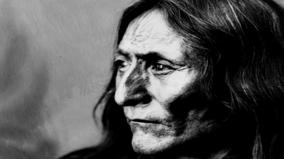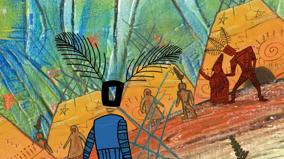Woman Dress
2019
6 min
Coming soon
Pre-contact, a Two Spirit person named Woman Dress travels the Plains, gathering and sharing stories. Featuring archival images and dramatized re-enactments, this film shares a Cuthand family oral story, honouring and respecting Woman Dress without imposing colonial binaries on them.

-
 FIVE@502019 5 films
FIVE@502019 5 filmsIn 1969, Canada passed Bill C-150 into law, which partially decriminalized homosexuality in Canada. Fifty years later, the NFB presents Five@50, a unique collection of five-minute shorts reflecting on contemporary LGBTQ2+ lives and identities. These intimate documentaries range from personal reflection to cultural history, and include experimental forms, animation and dramatization. When it comes to progress and queer culture, what have we gained? And what have we lost along the way?
Details
Pre-contact, a Two Spirit person named Woman Dress travels the Plains, gathering and sharing stories. Featuring archival images and dramatized re-enactments, this film shares a Cuthand family oral story, honouring and respecting Woman Dress without imposing colonial binaries on them.
-
writerTheo Jean Cuthand
-
directorTheo Jean Cuthand
-
producerJustine Pimlott
-
executive producerAnita Lee
-
featuringBeth CuthandTheo Jean CuthandKiley May
-
director of photographyGabriela Osio Vanden
-
editorMaria Todorov-Topouzov
-
costume designerSage Paul
-
production supervisorMarcus Matyas
-
unit production managerPriscilla Galvez
-
production coordinatorAndrew Martin-Smith
-
assistant cameraJacob White
-
gafferJohn Palanca
-
hair artistMisty Fox
-
makeup artistMisty Fox
-
sound recordistMiles ThorogoodKevin Riley
-
production assistantAlexander HumildeRenee Poujade
-
VFX supervisorMaria Todorov-Topouzov
-
transcriptionGrahame Hinton-Barber
-
manager studio operationsMark Wilson
-
studio administratorPatricia Bourgeois
-
technical coordinatorKevin Riley
-
studio coordinatorCarly Kastner
-
technical assistantQ'Mal Labad-Workman
-
marketing managerMelissa Wheeler
-
publicistJennifer Mair
-
legal counselChristian Pitchen
-
post production servicesSIM Post Toronto
-
coloristAndrew Ross
-
online editorTy Delgaty
-
assistant on-line editorSteve Thorpe
-
sound editorKathy Choi
-
assistant re-recording mixerJesse Fellows
-
re-recording mixerStacy Coutts
















